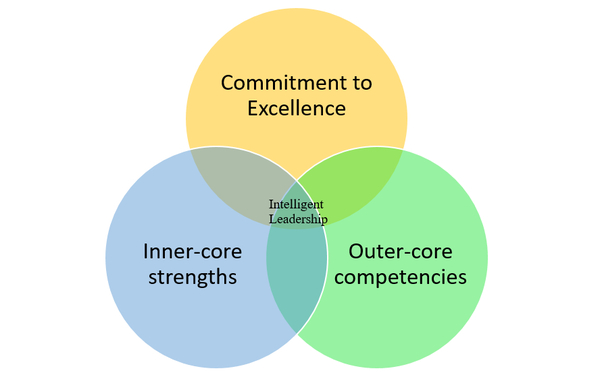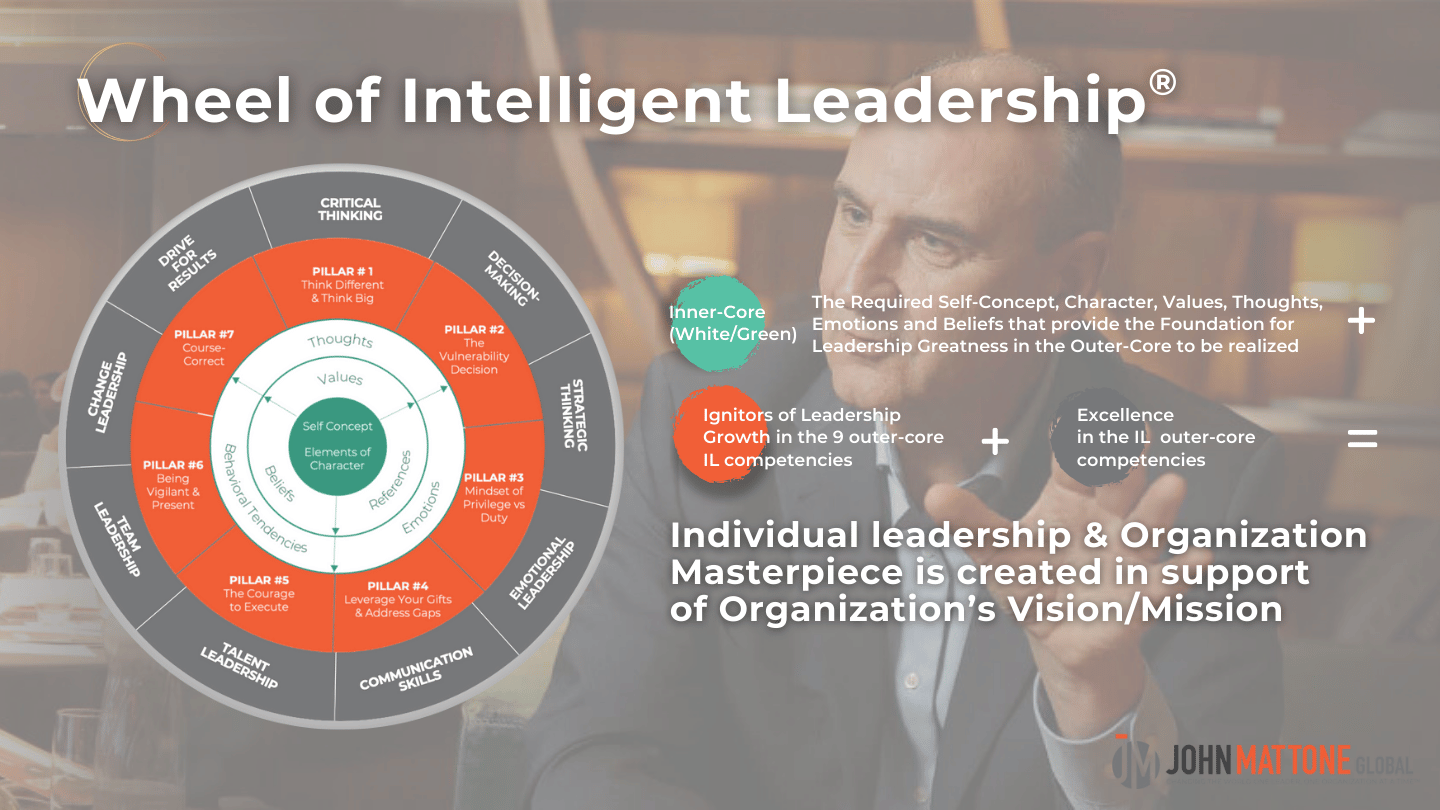THE WORLD’S #1 EXECUTIVE COACHING AND BUSINESS COACHING BLOG SINCE 2017.
Intelligent Leadership – All You Need To Know
April 26, 2025 | Category: Blog, Intelligent Leadership | Last updated on: May 4, 2025

When we think of great leadership, intelligence is often the first quality that comes to mind. From strategic decision-making to inspiring communication, intelligence plays a pivotal role in how leaders navigate uncertainty, influence others, and drive change.
Intelligence equips leaders with the capacity to make sound decisions, grasp complexity quickly, and lead others through ambiguity with confidence.
In fact, research across various fields confirms that intelligence is one of the key predictors of leadership effectiveness, particularly in volatile and rapidly changing environments.
A comprehensive meta-analysis published in the Journal of Applied Psychology found a consistent, positive correlation between general intelligence (IQ) and leadership effectiveness, particularly in roles that require complex problem-solving and high-level decision-making.
Intelligent leaders don’t just react but anticipate. They recognize patterns others miss. They connect the dots, think strategically, and make high-stakes decisions with clarity. From running global corporations to navigating national crises, cognitive ability underpins every meaningful leadership success story.
The Leadership Gap: When High IQ Falls Short
But here’s the nuance: while intelligence gives leaders their edge, it doesn’t make them complete. Some of the most intellectually gifted leaders have struggled to connect with teams, navigate conflict, or earn trust.
The same study that confirmed the positive relationship between IQ and leadership effectiveness suggests that the strength of the relationship is considerably lower than previously thought.
Intelligence can help you see the problem, but not necessarily solve it through people. And that’s where many of today’s leadership failures begin, not in the brain, but in the heart, character, and behavior of the leader.
Beyond IQ: The Emotional and Ethical Core of Great Leadership
A high IQ may open the door to leadership. Still, it’s emotional intelligence (EQ), integrity, and resilience that determine whether a leader can successfully walk through it and bring others along.
Research consistently shows that high-performing leaders excel in both cognitive and emotional domains.
The most impactful leaders activate a deeper, more integrated form of leadership intelligence—one that aligns head, heart, and soul.
They combine sharp thinking with empathy, humility, and self-awareness—traits that define the most admired leaders in history and business.
Intelligent Leadership: Leading with EQ, Strategy, and Purpose
The ability to lead with emotional intelligence and self-awareness is crucial for achieving sustainable success.
My approach, known as Intelligent Leadership, integrates emotional intelligence with strategic thinking to create a positive organizational culture, foster innovation, and drive growth.
Intelligent leaders understand their own emotions and those of their team members, which enhances communication, builds trust, and ultimately leads to higher job satisfaction and reduced employee turnover.
The Intelligent Leadership® Framework
The Intelligent Leadership® (IL) framework is a holistic, research-backed system for unlocking the full potential of leaders by transforming them from the inside out. As I share in my book, Intelligent Leadership, truly great leaders are not born, they’re forged through deep self-discovery, intentional development, and a relentless commitment to personal and professional excellence.
At the core of the IL philosophy lies the conviction that leadership maturity stems from aligning three interdependent domains:
- Inner-core strengths
- Outer-core competencies
- Commitment to excellence.
Intelligent leadership rests in the sweet spot of commitment to excellence, inner-core strengths, and outer-core competencies.
Intelligent leadership rests in the sweet spot of commitment to excellence, inner-core strengths, and outer-core competencies.
When these three domains are strengthened and harmonized, leaders gain the clarity, courage, and capacity to create lasting impact—for themselves, their teams, and their organizations.
Inner-Core Strengths: The Ignitors of Authentic Leadership
Your inner core is who you are, not what you do. It comprises the foundational elements of:
- Character – The moral and ethical foundation of leadership.
- Values – The guiding principles that shape decisions and priorities.
- Beliefs – The deeply held assumptions about yourself, others, and the world.
- Self-Concept – The way you see yourself and your leadership role.
These are the internal drivers that shape how you lead under pressure, how you influence others, and how resilient you are when the stakes are high.
Inner-core development is the starting point for Intelligent Leadership because no meaningful outer change can occur without inner transformation.
In our work, we help leaders strengthen this domain by identifying their “leadership maturity level,” uncovering self-limiting beliefs, and building the emotional intelligence muscles—like self-awareness and empathy—that sustain high performance.
Leadership begins and ends with character. And it is this deep character—the expression of your inner core—that creates lasting trust and influence.
Outer-Core Competencies: The Expression of Intelligent Leadership
Outer-core competencies encompass the skills and behaviors that you demonstrate as a leader.
These include:
- Critical Thinking: The ability to recognize assumptions, evaluate arguments, and draw conclusions. Leaders use this to solve complex problems and make unbiased decisions.
- Decision Making: Making timely, well-informed, and effective decisions that align with organizational objectives.
- Strategic Thinking: Anticipating future trends, identifying opportunities, and positioning the organization for long-term success.
- Emotional Leadership: Leading with emotional intelligence—empathy, self-regulation, and interpersonal effectiveness.
- Communication Skills: Clearly and effectively conveying ideas, listening actively, and facilitating open dialogue.
- Talent Leadership: Identifying, developing, and retaining high-potential people. Empowering and enabling others to grow.
- Team Leadership: Creating cohesion, trust, and high performance within teams. Aligning efforts and fostering collaboration.
- Change Leadership: Guiding organizations through transformation by inspiring and managing change with agility.
- Drive for Results: Holding yourself and others accountable, focusing on performance metrics, and pursuing goals with tenacity.
While inner-core development fuels authenticity, your outer core enables performance.
Intelligent Leaders consistently develop and calibrate these competencies to align their daily behaviors with their values and vision. They lead strategically, inspire their teams, and execute with clarity and consistency.
Developing these competencies involves honing your technical skills, enhancing your strategic thinking, and refining your ability to communicate and inspire.
Commitment to Excellence: The Leadership Multiplier
Commitment to excellence is the relentless pursuit of the highest standards in every endeavor. It reflects your dedication to ongoing growth and improvement, both personally and within your organization. As leaders, we must strive for excellence not only in our achievements but also in our character and interactions with others.
When these three elements align, you can understand and harness your abilities, commit to meaningful objectives, and recognize what is necessary to achieve success.
This alignment forms the foundation of Intelligent Leadership, empowering you to create powerful, engaging organizational cultures where team members are motivated to give their best efforts and continually seek improvement.
Clear, deliberate communication saves time and empowers team members.
The Role of Intelligence in Intelligent Leadership?
Intelligent Leadership integrates both cognitive and emotional intelligence, recognizing that while IQ drives clarity and execution, it is EQ that sustains influence, builds trust, and shapes a positive organizational culture.
Cognitive Intelligence and Intellectual Leader
IQ plays a critical role in the outer-core competencies of Intelligent Leadership. It supports:
- Critical Thinking & Strategic Execution – Leaders apply cognitive intelligence when analyzing complex challenges, setting direction, and driving business strategy.
- Decision-Making & Business Acumen – High-IQ leaders excel in processing information, identifying patterns, and making logical, data-driven decisions that align with organizational goals.
IQ also supports the Commitment to Excellence pillar, helping leaders understand systems, assess performance, and improve processes.
Emotional intelligence
Emotional intelligence is a cornerstone of Intelligent Leadership. It enables emotionally intelligent leaders to understand and manage their own emotions and those of their team members, profoundly impacting leadership effectiveness and organizational success.
Key Reasons Emotional Intelligence is Crucial:
- Understanding and Managing Emotions:
- Self-awareness: Recognize how emotions influence thoughts and behaviors.
- Self-regulation: Maintain composure and clarity in challenging situations.
- Building Strong Relationships:
- Empathy: Understand and share the feelings of team members.
- Handling tough conversations: Navigate conflicts and provide constructive feedback.
- Creating a Positive Organizational Culture:
- Psychological safety: Foster a culture where team members feel valued and supported.
- Job satisfaction: Enhance engagement and reduce employee turnover.
Developing Emotional Intelligence: Self-Awareness, Empathy, and Communication in Intelligent Leadership
The Role of Self-Awareness in Intelligent Leadership
Self-awareness allows leaders to recognize their strengths and weaknesses, making them more effective in their roles. By understanding their own behavior and emotional triggers, leaders can improve their decision-making and build stronger relationships with their team members.
This deep self-knowledge fosters authenticity and integrity, crucial traits for inspiring trust and respect within the team.
Emotionally Intelligent Leaders who are self-aware are better equipped to manage their emotions and reactions, leading to more composed and thoughtful responses in challenging situations. This self-management not only enhances personal performance but also sets a positive example for others to follow.
Developing Social Awareness and Practicing Empathy
Social awareness and empathy are critical for building strong relationships and fostering teamwork. Intelligent leaders who practice empathy can connect with their team members on a deeper level, creating a sense of trust and psychological safety.
This connection enables leaders to understand their team’s perspectives and needs, facilitating better communication and collaboration.
Empathetic leaders can navigate conflicts with sensitivity and care, ensuring that team members feel heard and valued. By promoting a culture of empathy, leaders can enhance team cohesion and drive collective success.
Communicating Effectively as an Emotionally Intelligent Leader
Effective communication is a cornerstone of Intelligent Leadership. Leaders must clearly convey their vision, listen to feedback, and address concerns promptly. This clarity ensures that everyone understands the goals and their roles in achieving them, fostering a sense of purpose and direction.
By maintaining open lines of communication and practicing empathy, leaders can build trust and ensure alignment within their teams.
This approach not only resolves issues quickly but also strengthens relationships and enhances overall team performance.
Over my three decades of global experience in talent management and executive development, I’ve seen how integrating these principles leads to sustainable success and a positive organizational culture.
Through Intelligent Leadership, we don’t just meet immediate goals; we build a legacy of excellence and continuous improvement.
Effective leaders not only improve their environment, they ensure others will continue to do so after they’re gone.
Real-Life Examples of Intelligent Leadership in Action
Examples of outstanding leadership take different paths, but all combine passion, humanity, hard work, and accountability. Exemplary leaders inspire through their actions.
Here are a few exemplary Intelligent Leaders:
Theo Epstein:
Theo Epstein, President of Baseball Operations for the Chicago Cubs, showcased Intelligent Leadership by understanding the human qualities of players. He transformed a group of athletes into a cohesive team. His leadership was instrumental in the Cubs’ historic 2016 World Series victory, demonstrating how emotional intelligence and teamwork can lead to far-reaching consequences in sports.
Jeff Bezos:
Jeff Bezos revolutionized retail with Amazon.com and IT with Amazon Web Services. Amazon has even won Academy Awards, showcasing Bezos’ visionary leadership and ability to innovate across industries. His professional experience and strategic thinking exemplify Intelligent Leadership, driving sustainable growth and success.
Inga Beale:
As CEO of Lloyd’s of London, Inga Beale had a tremendous impact on business in the City of London. By embracing technology and advocating for workplace diversity, she modernized a long-established organization, demonstrating how Intelligent Leadership fosters innovation and inclusivity.
Intelligent leadership allows long-established organizations to continue to develop and thrive.
Strive Masiyiwa:
Zimbabwean businessman and philanthropist Strive Masiyiwa founded the Higherlife Foundation, which provides scholarships and food to orphans. His commitment to sustainable investment and environmental leadership highlights the importance of integrity, compassion, and the ability to listen, key traits of Intelligent Leadership.
Whether or not a person reaches the status of a world-renowned leader, their character has an enormous impact on how they are remembered.
Intelligent Leadership is about continually striving for improvement, authenticity, and doing what is right, even when it’s hard. This approach turns a good leader into a great one, leaving a legacy of excellence.
Poor Leadership and Its Consequences
The destructive power of bad leadership can be astounding. There are several possible causes of bad leadership, including:
- Lack of communication
- Unclear communication
- Micromanagement
- Not making expectations clear
- Intimidation of team members
- Low emotional intelligence
A lack of emotional intelligence can lead to negative consequences such as lower employee engagement and higher turnover rates.
Bad leadership is costly, directly and indirectly. For one thing, the hard costs of turnover when a leader has to be fired and replaced can be staggering. The indirect costs, however, can be even worse. Team performance and employee development suffer under poor leadership.
Tomorrow’s leaders, who may recognize how bad the situation is becoming, may be the first to jump ship, which means it may be harder to plan for future leadership succession. Eventually, the entire organizational culture can turn toxic, plagued by high turnover, poor morale, and declining business performance.
How Can Leadership Coaches Help?
Leadership coaching helps leaders further fine-tune strengths, while bridging skills and performance gaps.
Leadership coaching helps leaders fine-tune their strengths while bridging skills and performance gaps. Coaches can have a profound influence on leaders, helping them navigate the complexities of their roles and achieve success. I regularly ask executives about the great leaders in their lives, and often, a former coach is credited for making a significant impact.
Great leaders often have role models who inspire them, but the individuals who truly make a difference are often parents, teachers, or coaches. Leadership coaches play a crucial role in preparing individuals to assume leadership roles effectively.
Without adequate training and coaching, the learning curve for new leaders can be steep, and the risks are higher.
When I coach executives, I emphasize that taking the more challenging path is often the right decision. Saying no to choices that don’t align with true and ethical values can be difficult. Still, this short-term difficulty leads to better long-term results without ethical or moral compromises.
The Impact of Leadership Coaching
- Strengthening Inner and Outer Core Characteristics: Targeted coaching helps leaders understand and enhance both their inner-core strengths and outer-core competencies. This holistic approach ensures that leaders are well-rounded and capable of facing any challenge.
- Navigating Opportunities and Risks: Coaching helps leaders recognize and seize opportunities while mitigating risks common in today’s fast-paced business world.
- Developing High Emotional Intelligence: Effective coaching helps leaders develop their emotional intelligence, enabling them to understand and manage their own emotions and those of their team members, which is crucial for organizational success.
With our Intelligent Leadership Executive Coaching, we focus on these aspects to create successful leaders who can drive their organizations to new heights. Our approach is based on extensive research and professional experience and tailored to meet each leader’s unique needs.
Conclusion:
The most effective leaders in today’s world are not just intellectually sharp—they are emotionally attuned and driven by purpose. While intelligence provides the cognitive edge to analyze complexity and make sound decisions, transformational leaders know that emotions play an equally vital role. They lead with a positive outlook, inspire trust through empathy, and foster a culture where teams thrive, not just perform.
Intelligent Leadership® unites IQ with emotional intelligence and character, forming a complete leadership model for lasting success. It equips leaders to think clearly, connect deeply, act decisively, and lead with authenticity. The future belongs to those who can align intellect, emotion, and integrity—and lead others to do the same.
To learn more about how our leadership coaching can help you develop high emotional intelligence and become a successful leader, schedule your Free Discovery Session today or visit our Intelligent Leadership Executive Coaching page.
FAQ
What is intelligent leadership?
Intelligent leadership is a framework that integrates cognitive intelligence, emotional intelligence, and character to help leaders unlock potential, build better interpersonal relationships, and drive real results.
Why is emotional intelligence important in leadership?
Emotional intelligence helps leaders manage negative emotions, lead with empathy, and improve communication, key components of successful human resource management and long-term performance.
What is the role of intelligence in leadership?
Intelligence allows leaders to make smart decisions, think strategically, and solve complex problems. It’s especially vital in fast-changing environments.
What does it take to be an intelligent leader?
An intelligent leader combines IQ, EQ, and integrity. They lead with vision, manage people well, and commit to continuous growth and excellence.
What is an emotionally intelligent leader?
An emotionally intelligent leader is self-aware, shows empathy, manages stress well, and builds trust across teams, leading to positive emotions and stronger engagement.
What are the key components of intelligent leadership?
The key components of intelligent leadership are cognitive intelligence (IQ), emotional intelligence (EQ), and character (CQ). This combination allows leaders to manage interpersonal relationships, guide teams through complexity, and promote positive emotions within organizational culture, making it a core principle of effective human resource management.
How does emotional intelligence affect leadership and performance?
Emotional intelligence is important because it helps leaders manage both their own and others’ negative emotions, create trust, and sustain healthy interpersonal relationships. These abilities are crucial for team cohesion, decision-making, and maintaining a culture of respect and collaboration, key priorities in modern human resource management.








